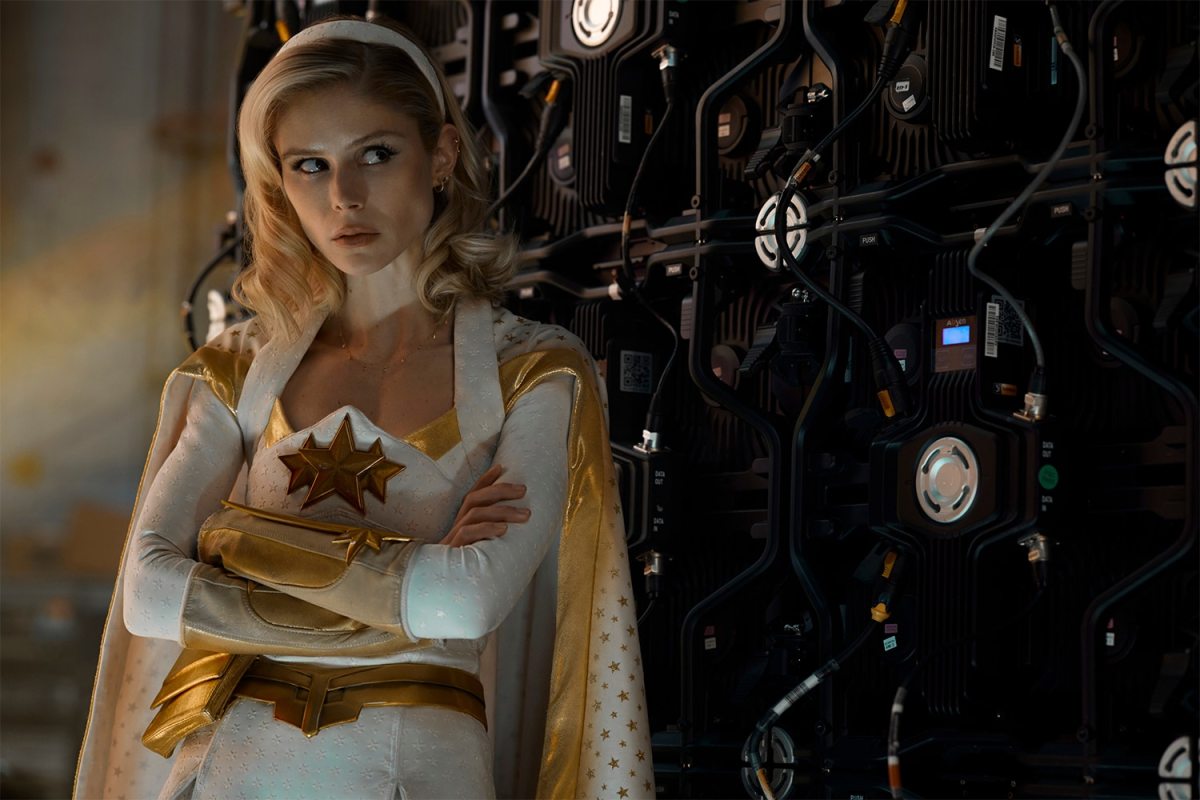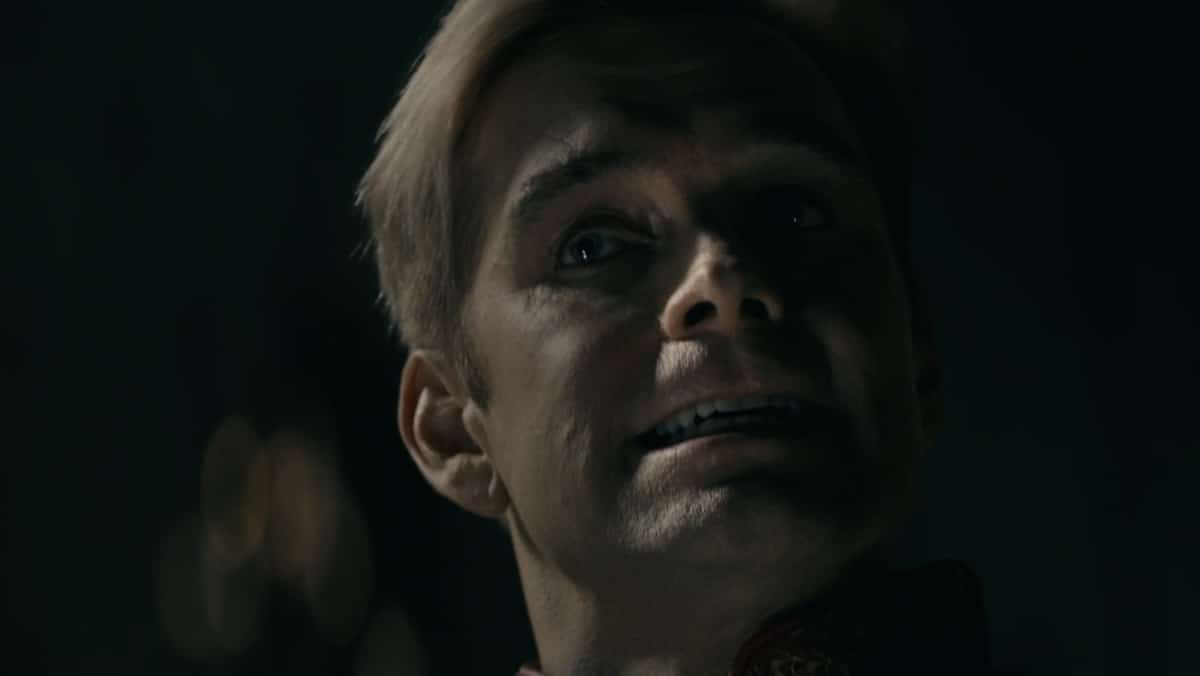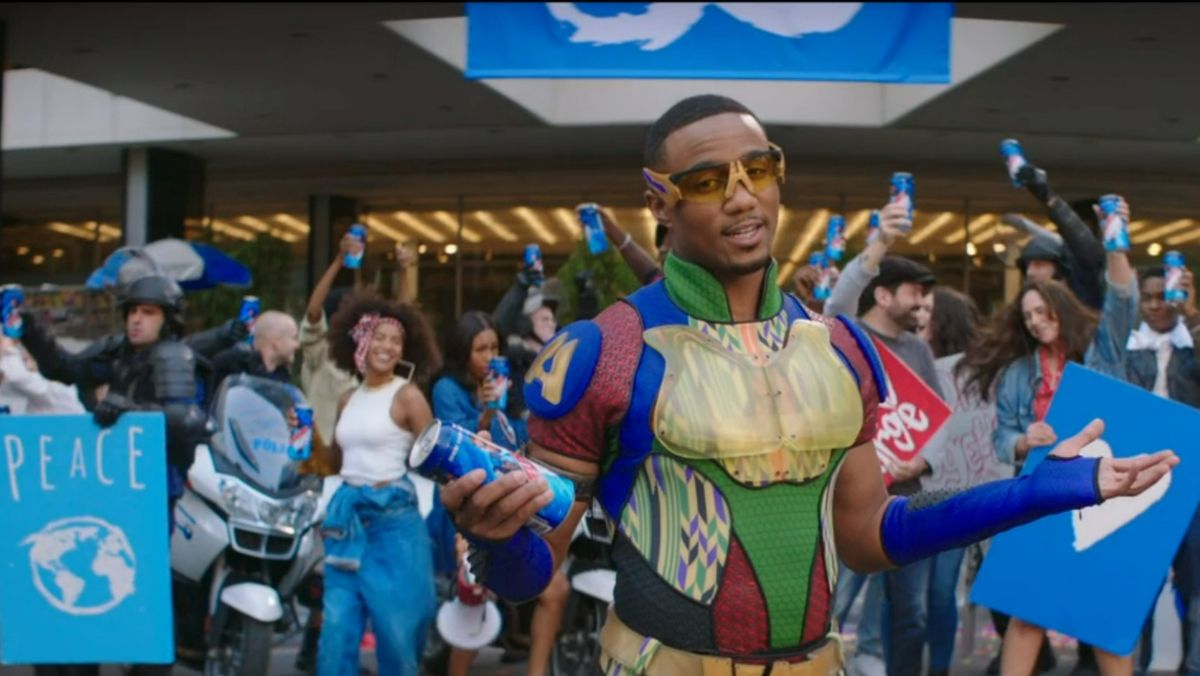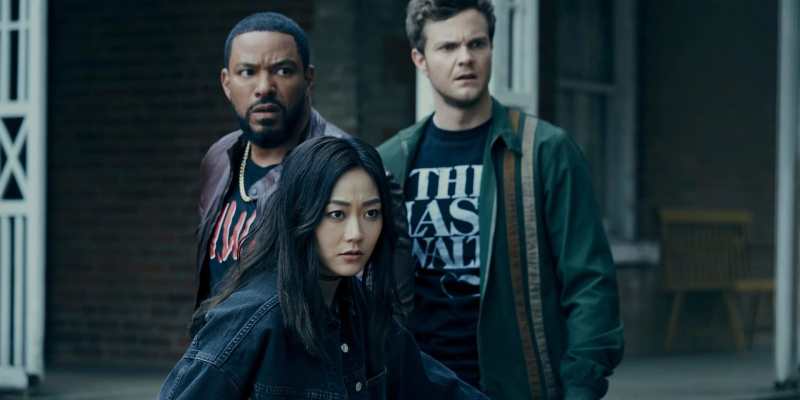This discussion and review contains spoilers for The Boys season 3, episode 6, “Herogasm.”
As interesting as it is to discuss The Boys in terms of the show’s study of masculinity, fatherhood, and American identity, it is easy to overlook one very simple aspect of the series: It’s fun.
There are legitimate criticisms to be made about the pacing and the structure of The Boys. Each of the three seasons to date has been structured as something akin to a decompressed comic book arc — a story with a core ensemble and a new guest cast, built around strong thematic elements, that inevitably reverts to something close to the status quo when all is said and done. The show has an established template and format and doesn’t veer too far from that.
This is obvious even looking at the third season. The second season ended with the promise that Butcher (Karl Urban) would be working with the government and seemingly reconnecting with his wife’s son Ryan (Cameron Crovetti), and Hughie (Jack Quaid) was working with Congresswoman Victoria Neuman (Claudia Doumit). However, within a few episodes of the third season premiere, The Boys had reverted back to its tried-and-tested format of Butcher and Hughie as vigilantes.
Characters like Deep (Chace Crawford) and Starlight (Erin Moriarty) might be exiled from the Seven, but the show will push back to the familiar setup. Supporting characters may die, but the show’s reputation for brutality doesn’t really extend to its core cast. With this in mind, it makes sense that one of the persistent criticisms of this third season is that the show “needs a new punchline,” as some critics wonder “how the series will keep existing without spinning its wheels.”

This is all perfectly fair. However, for all that critics are quick to accuse The Boys of “pushing the boundaries of taste” in favor of “relentless, vulgar maximalism,” the show remains better at superhero storytelling than many of its genre contemporaries. If one strips away the cussing and the gore, The Boys understands the basic mechanics and rhythms of a superhero story better than any of the superhero shows streaming on Disney+.
The Boys isn’t a cult or subversive hit. The series occupies pride of place in Amazon’s streaming lineup. Jennifer Salke, head of Amazon Studios, expressed that the first season quickly became “one of our most watched Amazon Original series.” The second season premiere reportedly held its own against Netflix and Disney+ crown jewels Stranger Things and The Mandalorian. Amazon has begun production on a live-action college-set spin-off to accompany the animated Diabolical.
The show has clean character arcs, understanding what each lead wants and the obstacles that stand in their way. It also has a strong sense of theme, fundamentally understanding what the show is about and building outwards from there. While the show’s three season-long arcs can occasionally feel a little neat in how they conclude, even that neatness speaks to an understanding of basic narrative structure. Whatever one might think of the story it’s telling, The Boys tells it well.
More to the point, The Boys seems to actively enjoy being a superhero television show. It takes a great deal of pleasure in the opportunities that the genre affords for creative storytelling and visual playfulness. While The Boys certainly isn’t competing with the surrealist and absurdist imagery of something like Legion, it is much giddier in its use of superpowers and concepts than most modern mainstream superhero films and television shows.

So many modern superhero stories devolve into the cliché of superheroes blasting different-color beams of computer-generated energy at one another, which feels like something of a wasted opportunity given the creative potential for superhero powers. Indeed, it is no small irony that “Herogasm” features just such a confrontation between the temporarily superpowered Butcher and Homelander (Antony Starr) amid everything else going on.
The third season premiere featured a suitably demented battle against the size-changing hero Termite (Brett Geddes), who is transparently modeled on Ant-Man (Paul Rudd). Indeed, Termite is introduced accidentally enlarging while inside another person, with predictable results. Showrunner Eric Kripke admitted that the writing team was inspired by a meme about how Ant-Man could defeat Thanos (Josh Brolin) in Endgame, itself rooted in a Grant Morrison and Howard Porter JLA issue. Kripke joked that the creative team wanted to “give the audience what they wanted with Ant-Man, but couldn’t get from Marvel.”
“Herogasm” is structured around such moments, with the entire episode built up from a superhero orgy in which the participants find perverted uses for their powers. Kripke boasted that he had been challenged to adapt “Herogasm,” the subject of its own spin-off comic, from “day one” — and that getting to do it was a “reward” for two successful seasons.
This is certainly set up for some very juvenile humor, as Mother’s Milk (Laz Alonso) gets covered in both lube and semen in quick succession. However, even outside of the orgy, there is room for some particularly creative and brutal applications of superpowers, with A-Train (Jessie T. Usher) using his superspeed to drag Blue Hawk (Nick Wechsler) so fast that he is effectively turned to bloody pulp against the tarmac surface of the road beneath him.

The R-rated nature of these particular set pieces make it difficult to imagine a comparable set piece on something like The Falcon and the Winter Soldier or Hawkeye. However, even smaller storytelling choices within The Boys feel much more adventurous than anything in the Marvel Cinematic Universe. “Glorious Five Year Plan” featured A-Train in a spoof of the infamous Kendall Jenner Pepsi commercial. “Herogasm” opens with a riff on Gal Gadot’s absurd “Imagine” video.
The Boys features layers upon layers of mediated reality. The season opened with Charlize Theron appearing in a scene from the in-universe film Dawn of the Seven. Flashbacks in “Glorious Five Year Plan” featured Soldier Boy (Jensen Ackles) performing Blondie’s “Rapture” on Solid Gold. “Herogasm” features a television rerun of Soldier Boy’s appearance in a Reagan-era propaganda film praising “our mujahideen brothers,” recalling movies of the period like The Living Daylights or Rambo III.
In contrast, in the Marvel Cinematic Universe, everything bends towards the house style. Director Chloé Zhao boasted that Eternals would contain a “beautiful joyous dance sequence” straight from Bollywood, but the sequence is shot in such a way that nobody would actually confuse it with an actual Indian musical number. In contrast, “Last Time to Look on This World of Lies” gave Kimiko (Karen Fukuhara) a much more stylistically convincing and charming riff on a Busby Berkeley musical number in the hospital.
None of this is especially novel, but it is effective. It also underscores the extent to which so much of the modern superhero genre has stagnated. In “Herogasm,” Homelander finds himself conversing with the only person that he can trust: his own reflection. It recalls memorable scenes with Norman Osborn (Willem Dafoe) from Sam Raimi’s Spider-Man two decades ago. It underscores exactly what was missing from similar scenes featuring Dafoe in Spider-Man: No Way Home.
While it is easy to get distracted by the crass vulgarity of “Herogasm” and the ways in which The Boys pushes its own boundaries, the truth is that the show’s strength is more fundamental than any of that. More than a lot of its more mainstream brand-name competitors, The Boys not only understands the conventions of this sort of pulp storytelling, but it revels in the raw potential of them.
